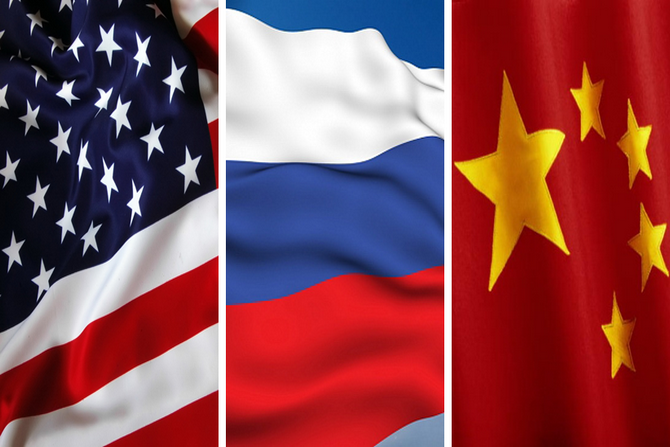
February 6, 2015 Center for the Study of International Relations in the Asia-Pacific and Far Eastern State University of Humanities held a round table discussion on “Security issues in the Asia-Pacific region in the context of the current geopolitical situation.” The main objective was to identify the round reaction of ATP events around Ukraine and their influence on relations with Russia, as well as monitoring the geopolitical situation in the Asia-Pacific region as a whole.
The roundtable was attended by leading experts TSIMO ATP doctor of historical sciences Alepko AV Anisimov AL, V. Tymoshenko, Ph.D. Ivanov A., Romanov MI, AV Samokhin ., a graduate student DVGGU Chernov KS, teacher DVGGU Slivko SV As a special guest in the work attended by the head of the Khabarovsk Office of the Consulate General of the Russian Federation in North Korea Kim Myung-September.
The roundtable was opened by the director of the Center for the study of international relations in the Asia-Pacific region VN Tymoshenko, who analyzed the response to the crisis Ukrainian Australia and addressed the issues of Russian-Australian relations. In his opinion the media in Australia are very few pay attention to the situation around Ukraine, limited reprints of the leading Western media such as the BBC, Reuters, Washington Post and others. Virtually no analyzes how the Australian media and the Australian scientific community. Even the official government websites (and Australia are known to support anti-Russian sanctions) information on these events is very scarce and does not contain any analysis. It seems that Australia, on the one hand adheres to the general policy of the West, and the other does not want to spoil relations with the Russian Federation. This is evidenced by the fact that after a clumsy statement of the Australian Prime Minister Tony Ebota the Russian president, leading Australian media attacked him with sharp criticism of then prime minister was forced to soften its rhetoric. Do not want to spoil relations with Russia and the Australian business. As one of its representatives, “we have to work as if nothing is happening.” Confirmation of this position was the work of the Russian-Australian business dialogue, which took place as usual, immediately after the accession of Australia to sanctions. Many joint projects as continued and will continue. As the Minister for Trade and Investment Australia Andrew Robb “We want to Russia we had established good trade and political relations.”
On the reaction of the Ukrainian crisis in China and South-East Asia told Romanov MI In her view, China shows full solidarity with Russia. Chinese media have given priority to this situation, and full of sympathy for the Russian position. Of course, China is looking for a specific economic benefit in bilateral relations, but categorically rejects Western pressure exerted on our country. Considerable sympathy for Russia and different media of Southeast Asia. None of the Southeast Asian countries did not join the anti-Russian actions. Many publications contain an interesting analysis of the events, such as Asia Times. It can be seen that the elite of these countries interested in continuing and deepening co-operation with the Russian Federation.
In his speech of Samokhin AV contained an analysis of the military-political situation in Northeast Asia. He elaborated on the military potential of the region, compared of military capabilities. In view of the serious presence of US forces, especially on the Korean Peninsula, Samohin AV advises increase of Russian forces in the Far East, especially its technical component.
Anisimov AL in his speech focused on the Russian-Japanese relations. Although the Japanese government and supported the anti-Russian sanctions made it sparingly, taking care not to harm economic relations between the two countries. Obviously, the Japanese government has taken such a step under pressure from the United States, than actually admitted the Prime Minister of Japan. Attention is drawn to the fact that some Japanese media attributed the reunification of the Crimea with Russia with the situation around the Kuril Islands: if Russia returned Crimea, why she did not return to Japan the Kuril Islands. Anisimov AL showed that this view is not widespread among the Japanese public and is not supported by the Japanese government.
In his speech Alepko AV was an analysis of the situation in the South China Sea and the prospects for cooperation between Russia and involved in this conflict countries.
On the reaction of South Korea on the events surrounding the Ukraine told Ivanov AY South Korea has not joined the anti-Russian actions of the West, despite strong pressure from the United States. No indication that Russian-South Korean relations will decline not. Ivanov AY gave examples of cooperation between the two countries in the economic field.
The theme of Russian-Korean relations continued Chernov KS, which focused on military-technical cooperation. He noted that the special interest for South Korea is not ready Russian military equipment and technology it needed to build its weapons. The two countries over the past 10 years, tremendous progress has been achieved in the implementation of joint investment projects, cooperation in the aerospace field, significantly increase turnover, etc. All these factors will undoubtedly have a positive effect on bilateral military ties between and give rise to a new phase of military-technical cooperation between Moscow and Seoul.
The head of the office of the Khabarovsk Consulate General of the Russian Federation in North Korea Kim Myong September thanked the speakers for interesting presentations and in-depth analysis of the current situation in the Asia-Pacific region and expressed hope for deepening cooperation between experts and scientists from Russia and the DPRK.

 January 16, 2015
January 16, 2015  Опубликовано в
Опубликовано в